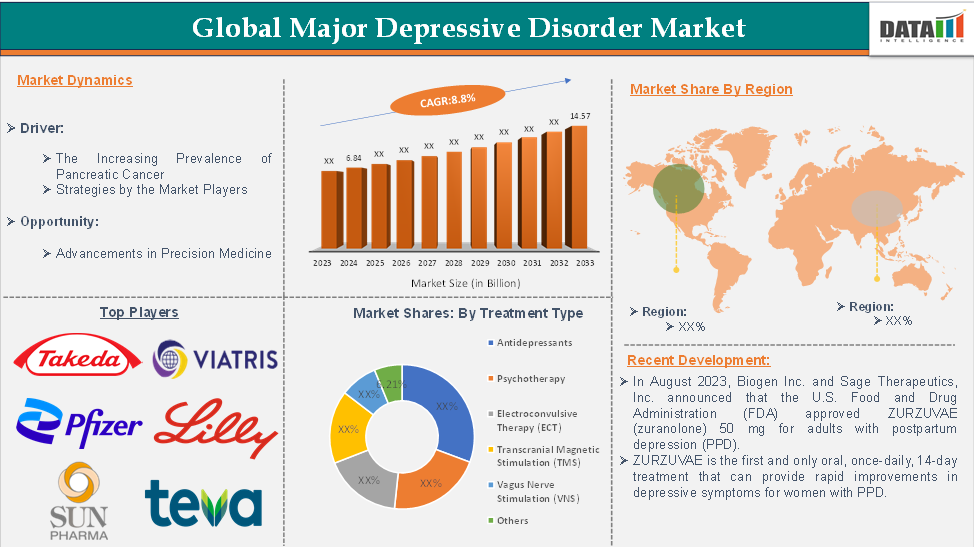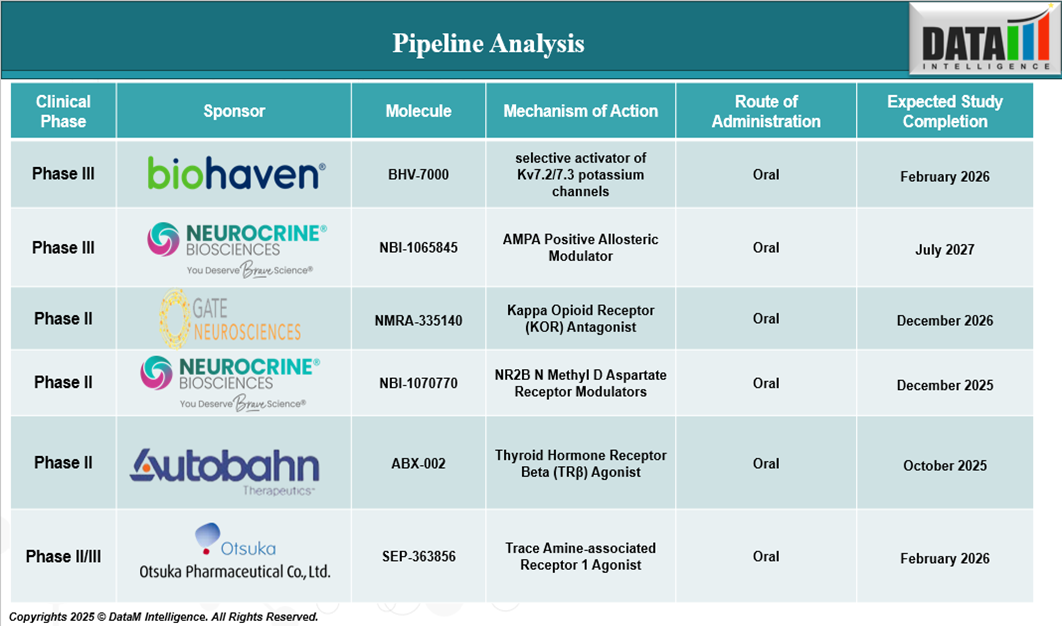Overview
Major Depressive Disorder (MDD) is a common and serious mental health condition characterized by persistent feelings of sadness, hopelessness, and a lack of interest or pleasure in daily activities. It can significantly impair a person’s ability to function socially, professionally, and emotionally. MDD is more than just occasional sadness.
Treatment for MDD typically involves a combination of approaches tailored to the individual’s needs. Antidepressant medications, such as SSRIs and SNRIs, are commonly prescribed to help regulate brain chemicals linked to mood. Psychotherapy, particularly cognitive behavioral therapy (CBT), is also widely used to help individuals develop coping strategies and change negative thought patterns.
In more severe or treatment-resistant cases, other options like electroconvulsive therapy (ECT), transcranial magnetic stimulation (TMS), or newer therapies like esketamine may be considered. With early diagnosis and proper treatment, many individuals with MDD can manage their symptoms effectively and lead fulfilling lives.
Executive Summary

Market Dynamics: Drivers & Restraints
Rising Prevalence of Major Depressive Disorder
The rising prevalence of major depressive disorder (MDD) is expected to be a significant factor driving the growth of the MDD treatment market. As more individuals are affected by depression due to factors such as increasing stress levels, changing lifestyles, social isolation, and post-pandemic mental health challenges, the need for effective and accessible treatment options becomes more urgent. This growing burden of mental health issues has led to greater awareness and diagnosis rates, prompting healthcare providers and governments to prioritize mental health services.
For instance, according to the World Health Organization report published in 2023, an estimated 3.8% of the global population is affected by depression, including 5% of adults, 4% of men, and 6% of women, highlighting a substantial gender disparity with depression being approximately 50% more prevalent among women.
Furthermore, the prevalence rises to 5.7% among adults over the age of 60, emphasizing the growing need for treatment options among aging populations. With approximately 280 million people worldwide currently living with depression, the sustained and widespread demand for effective therapeutic interventions is fueling market growth. These statistics underscore a critical need for continued innovation in pharmacological and non-pharmacological treatments to meet the diverse needs of patients across demographic segments. As a result, demand for therapies, including medications, psychotherapy, and digital interventions, continues to rise, fueling innovation and investment in the market.
The ongoing emphasis on mental health as a critical component of overall well-being further solidifies the central role of MDD treatments in global healthcare strategies. With the rising number of individuals suffering from major depressive disorder, companies are focusing on the development of new drugs. Many of these drugs are gaining positive results and are expected to get approvals, proving their safety and efficacy.
For instance, Otsuka Pharmaceutical Development & Commercialization, Inc. (Otsuka) and Lundbeck Pharmaceuticals LLC (Lundbeck) unveiled new clinical findings from their Phase II (Trial 061) and Phase III trials (Trials 071 and 072) assessing the safety and efficacy of brexpiprazole in combination with sertraline for the treatment of adults with post-traumatic stress disorder (PTSD). The results were presented at the American Society of Clinical Psychopharmacology (ASCP) Annual Meeting in Miami.
Side Effects and Safety Concerns
Side effects and safety concerns associated with antidepressant medications pose a significant challenge to the growth of the major depressive disorder (MDD) market. Many commonly prescribed treatments, such as SSRIs, SNRIs, and atypical antidepressants, are associated with adverse effects, including weight gain, sexual dysfunction, insomnia, emotional blunting, and increased anxiety in early treatment stages.
More severe risks, such as suicidal thoughts and behaviors, particularly in adolescents and young adults, have led to black box warnings and cautious prescribing practices. These safety concerns can result in poor treatment adherence, early discontinuation, and reluctance among patients to initiate or continue therapy.
Pipeline Analysis

Segment Analysis
The global Major Depressive Disorder Market is segmented based on type, treatment type, and region.
Treatment Type:
The antidepressants segment is expected to dominate the major depressive disorder treatment market
The antidepressants segment is expected to dominate the major depressive disorder (MDD) market, largely due to its central role in managing the condition and the broad range of medications available to treat various forms and severities of depression. These drugs, including SSRIs, SNRIs, atypical antidepressants, and others, are widely prescribed as the first-line treatment for MDD, offering proven efficacy and flexibility across different patient profiles.
Additionally, recent FDA approvals have further bolstered the segment's growth. For instance, in December 2022, the FDA approved VRAYLAR (cariprazine) as an adjunctive therapy to antidepressants for adult patients with MDD, as reported by AbbVie. Cariprazine, marketed as VRAYLAR in the U.S., is also FDA-approved for treating adults experiencing depressive episodes, acute manic episodes, and mixed episodes associated with bipolar I disorder, alongside schizophrenia.
Major players are conducting clinical trials in developing effective antidepressant drugs for the treatment of major depressive disorder. For instance, in May 2024, Johnson & Johnson announced positive topline results from the pivotal Phase 3 MDD3001 clinical trial, which evaluated the efficacy and safety of seltorexant as an adjunctive therapy to standard antidepressants in adult and elderly patients with major depressive disorder (MDD) who experience symptoms of insomnia.
These factors, combined with ongoing research and development efforts, are expected to keep antidepressants at the forefront of the MDD treatment landscape.
Geographical Analysis
North America is expected to hold a significant position in the global major depressive disorder treatment market, with the highest market share
North America is expected to hold a significant position in the global major depressive disorder (MDD) treatment market, largely due to its high prevalence of depression, advanced healthcare infrastructure, and strong investment in research and development. The United States, in particular, reports millions of MDD cases annually, leading to increased awareness and higher treatment-seeking behavior.
The region also benefits from robust support from regulatory agencies like the FDA, which accelerates the approval of innovative therapies. For instance, in August 2022, Axsome Therapeutics, Inc. received FDA approval for AUVELITY (dextromethorphan HBr - bupropion HCl) extended-release tablets. This marked AUVELITY as the first and only oral N-methyl D-aspartate (NMDA) receptor antagonist authorized for treating major depressive disorder (MDD) in adults.
Furthermore, the presence of major pharmaceutical companies and the increasing research and development of new drugs to serve the majority of the patients are significantly contributing to the market growth. For instance, in February 2025, Intra-Cellular Therapies announced that the U.S. FDA accepted its supplemental new drug application (sNDA) for CAPLYTA (lumateperone) to be used as an adjunctive treatment for adults with major depressive disorder (MDD). These factors collectively position North America as a dominant player in the global MDD treatment landscape.
The regulatory framework and the support for the approval of various drugs in the region are encouraging individuals to conduct various studies. For instance, in August 2023, Biogen Inc. and Sage Therapeutics, Inc. announced that the U.S. Food and Drug Administration (FDA) approved ZURZUVAE (zuranolone) 50 mg for adults with postpartum depression (PPD). ZURZUVAE is the first and only oral, once-daily, 14-day treatment that can provide rapid improvements in depressive symptoms for women with PPD.
Competitive Landscape
Top companies in the Major Depressive Disorder Market include Pfizer Inc., Takeda Pharmaceutical Company Limited, Teva Pharmaceutical Industries Ltd., Viatris Inc., Sun Pharmaceutical Industries Ltd., Eli Lilly and Company, Otsuka Pharmaceutical Co., Ltd., Aurobindo Pharma Limited, Sanofi, Biogen, among others.
Key Developments
- In April 2025, MindMed recently announced that the first patient had been dosed in its Phase 3 Emerge study, which is investigating MM120 ODT for the treatment of major depressive disorder (MDD). MM120 ODT is a proprietary, pharmaceutically refined formulation of lysergic acid diethylamide (LSD), developed to optimize its therapeutic potential.
- In March 2025, Neuronetics, Inc., with the leading neurohealth therapies in the world, announced that Evernorth Health Services, a wholly owned subsidiary of The Cigna Group, has expanded its coverage of NeuroStar Transcranial Magnetic Stimulation (TMS) to include adolescents aged 15 and older living with major depressive disorder (MDD).
Scope
| Metrics | Details | |
| CAGR | 8.8% | |
| Market Size Available for Years | 2022-2033 | |
| Estimation Forecast Period | 2025-2033 | |
| Revenue Units | Value (US$ Bn) | |
| Segments Covered | Type | Seasonal Affective Disorder, Prenatal Depression, Postpartum Depression, Atypical Depression |
| Treatment Type | Antidepressants, Psychotherapy, Electroconvulsive Therapy (ECT), Transcranial Magnetic Stimulation (TMS), Vagus Nerve Stimulation (VNS), Others | |
| Regions Covered | North America, Europe, Asia-Pacific, South America, and the Middle East & Africa | |
Why Purchase the Report?
- Pipeline & Innovations: Reviews ongoing clinical trials, product pipelines, and forecasts upcoming advancements in medical devices and pharmaceuticals.
- Product Performance & Market Positioning: Analyze product performance, market positioning, and growth potential to optimize strategies.
- Real-World Evidence: Integrates patient feedback and data into product development for improved outcomes.
- Physician Preferences & Health System Impact: Examines healthcare provider behaviors and the impact of health system mergers on adoption strategies.
- Market Updates & Industry Changes: Covers recent regulatory changes, new policies, and emerging technologies.
- Competitive Strategies: Analyzes competitor strategies, market share, and emerging players.
- Pricing & Market Access: Reviews pricing models, reimbursement trends, and market access strategies.
- Market Entry & Expansion: Identifies optimal strategies for entering new markets and partnerships.
- Regional Growth & Investment: Highlights high-growth regions and investment opportunities.
- Supply Chain Optimization: Assesses supply chain risks and distribution strategies for efficient product delivery.
- Sustainability & Regulatory Impact: Focuses on eco-friendly practices and evolving regulations in healthcare.
- Post-market Surveillance: Uses post-market data to enhance product safety and access.
- Pharmacoeconomics & Value-Based Pricing: Analyzes the shift to value-based pricing and data-driven decision-making in R&D.
The global Major Depressive Disorder Market report delivers a detailed analysis with 68 key tables, more than 61 visually impactful figures, and 198 pages of expert insights, providing a complete view of the market landscape.
Target Audience 2024
- Manufacturers: Pharmaceutical, Medical Device, Biotech Companies, Contract Manufacturers, Distributors, Hospitals.
- Regulatory & Policy: Compliance Officers, Government, Health Economists, Market Access Specialists.
- Technology & Innovation: AI/Robotics Providers, R&D Professionals, Clinical Trial Managers, Pharmacovigilance Experts.
- Investors: Healthcare Investors, Venture Fund Investors, Pharma Marketing & Sales.
- Consulting & Advisory: Healthcare Consultants, Industry Associations, Analysts.
- Supply Chain: Distribution and Supply Chain Managers.
- Consumers & Advocacy: Patients, Advocacy Groups, Insurance Companies.
- Academic & Research: Academic Institutions.
Suggestions for Related Report
- Antidepressant Drugs Market
- Antiepileptic Drugs Market
- Schizophrenia Drugs Market
- For more pharmaceutical-related reports, please click here